Choosing blankets from pompons
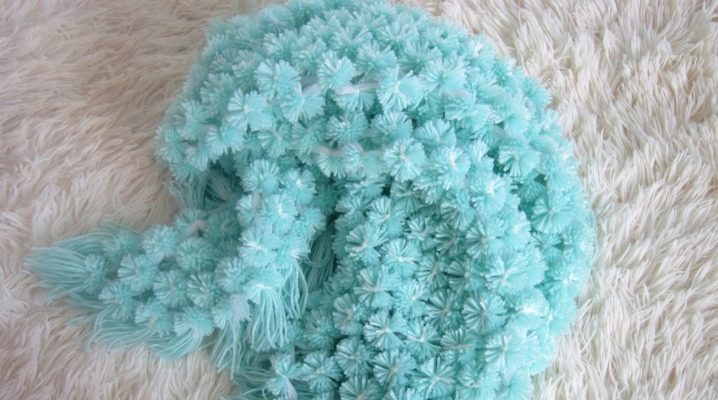
It is difficult to imagine the home of a modern person without stylish functional things: today, any thing must adapt to the user's needs. One of the stylish interior accessories are blankets - charming capes with a pleasant texture and unusual design, for example, made of pompons. However, not all products are durable and, depending on the manufacturing method, differ in terms of service life. We choose blankets from pompons: we note the subtleties of choice, taking into account different designs and functionalities.
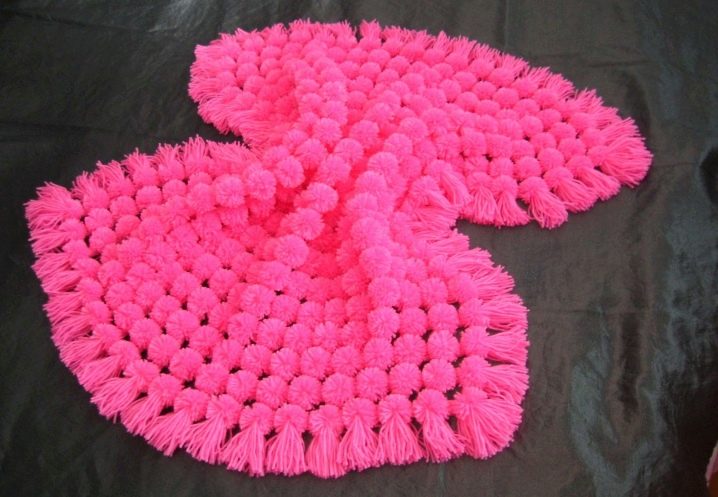
Functionality
Pom-pom blankets are unique textile accessories.
They are able to perform several tasks at once:
- are a stylish decoration of different types of furniture (adult or children's bed, sofa, armchair, chair);
- protect the surface of the sleeping bed or sofa seat from abrasion, mechanical damage, dust, dirt, moisture;
- give furniture a neat look, successfully replacing a classic blanket or bedspread;
- able to become a light blanket, covering the user;
- cope with the role of a sweater or a voluminous scarf, wrapping the body in a cool room;
- being made for babies, they are transformed into a diaper envelope (relevant when leaving the hospital);
- if necessary, they can become a baby's rug for playing.
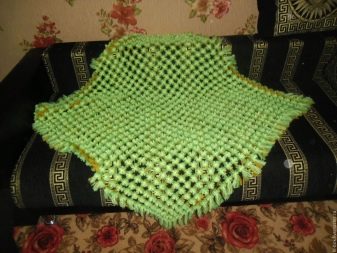
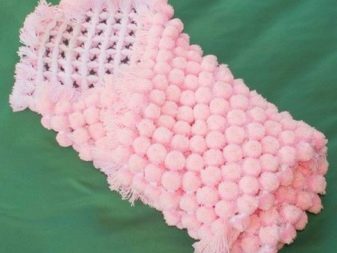
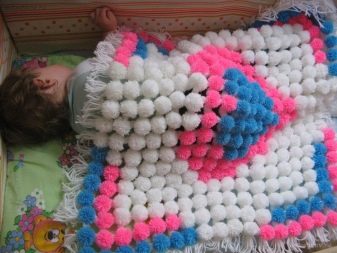
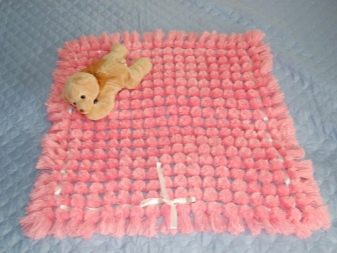
The versatility of pom-pom blankets makes them special and in demand. And given their unusual appearance, they are desirable in every home.
Advantages and disadvantages
Pom-pom blankets are fabrics of different lengths and widths with an unusual texture. These are colorful bedspreads made of round or oval elements located close to each other. A pompom is a dense ball of yarn, other fibers, or a thickened thread. Combining with many similar elements, it provides the blanket with a special embossed texture and warmth.
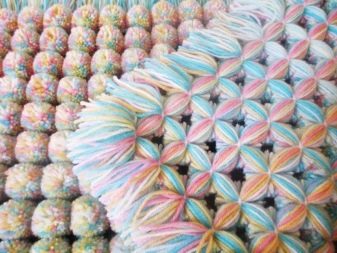
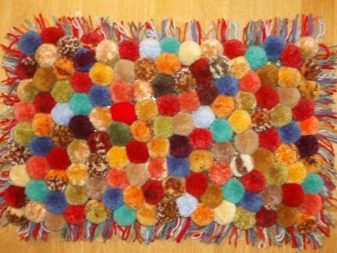
Such products bring fresh colors to the style of the room.
Pom-pom blankets:
- perfectly let through air, when performing the function of a blanket, they do not overheat the user's body (excluding sweating);
- not limited in shape: they are classic rectangular, in the form of an oval, square, circle, hexagon, silhouettes of an animal, insect and fruit;
- never repeated, therefore recognized as exclusive items;
- based on the characteristics of the size range, they are suitable for furniture with different dimensions;
- intended for children and adults, decorating the accent area of the room (relevant in the design of the bedroom, living room, kitchen, nursery);
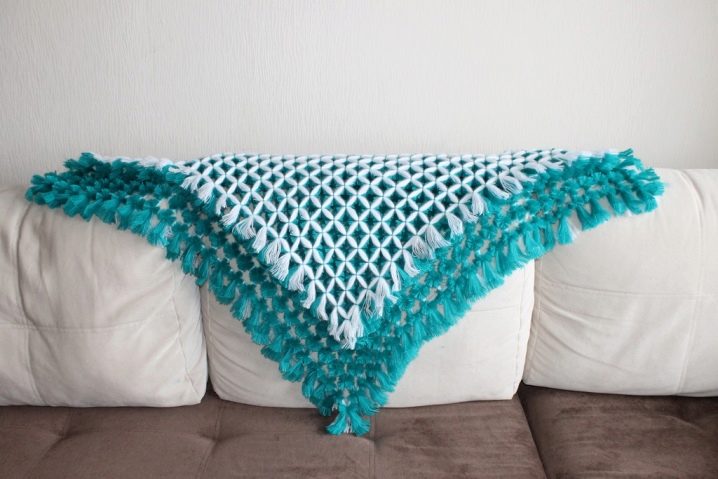
- are made of natural, artificial threads and yarns of a mixed composition that does not irritate the user's skin (wool, acrylic, limbage, cotton, velsoft, cashmere, etc.);
- do not need wet heat treatment and are completely self-sufficient without additional decoration;
- are not limited in the color palette, therefore they can be made from flowers of any shade in a monochromatic or mélange version, with a pattern of contrasting threads;
- able to bring home comfort and warmth into the atmosphere of the room;
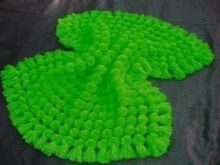
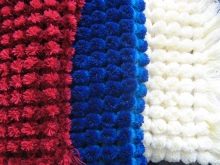
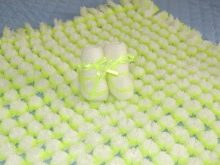
- made from small fragments of light colors, they create the visual effect of a large space;
- are an independent accent of a room or a component of a set, complemented by covers for decorative pillows or identical covers for the back of a sofa (chair);
- can be made separately from the general idea of the room design or customized to a specific piece of furniture;
- made from natural wool fibers, have health benefits.
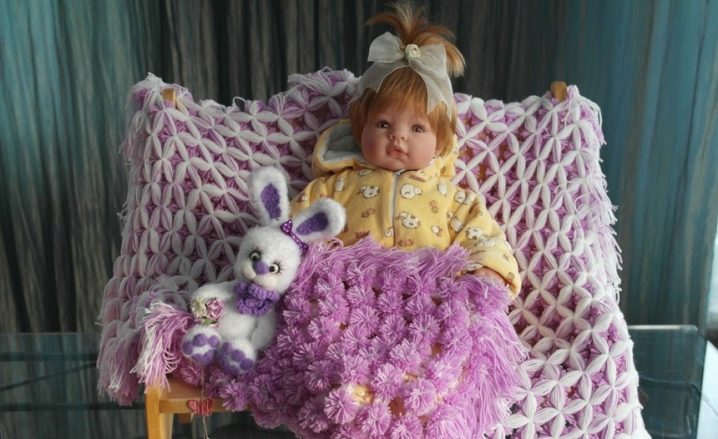
Blankets made of wool pom poms Are favorites among such accessories. Due to the special structure of the fiber and the presence of a natural antiseptic lanolin, they, like the usual woolen counterparts, are useful for humans.
Such models:
- create and maintain a "correct" climate between the body and the blanket, so overheating is impossible even in the case of a dense arrangement of woolen balls;
- are distinguished by a beneficial effect on the human body, increasing its immunity to colds and calming the nervous system;
- improve the work of the circulatory system and relax the muscles of the body, increasing the comfort of rest (sleep);
- with regular use, they can reduce pain in the lumbar region, neck, back, relieve the user of the unpleasant feeling of numbness in the limbs.
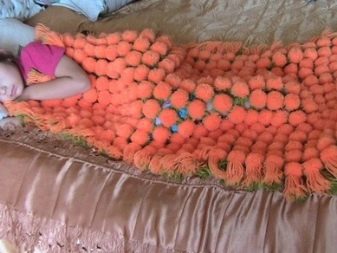
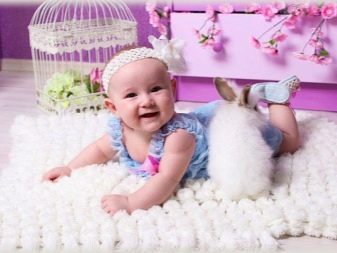
With a lot of positive qualities, pom-pom blankets have several disadvantages:
- need a considerable amount of time to create, patience and perseverance in work;
- are made from a larger amount of raw materials compared to conventional knitted counterparts;
- differ in the large weight of the finished blanket (especially models for a one-and-a-half, double bed or large sofa);
- need a gentle wash without mechanical movements;
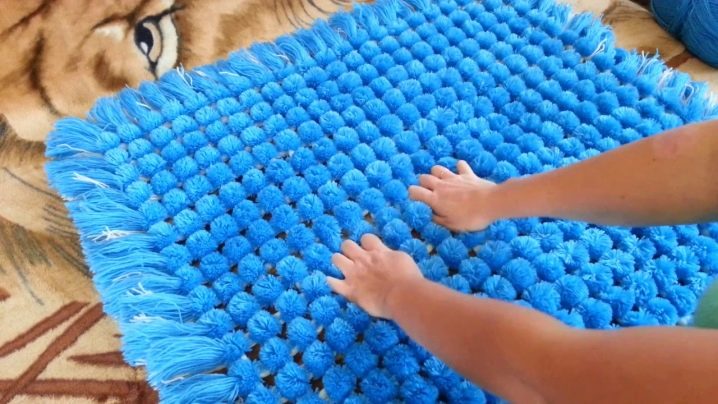
- require delicate handling, otherwise they may crumble into separate pieces of threads;
- in products made from natural raw materials, they are prone to the appearance of moths if they are not washed or stored in a dark place (a damaged thread for attaching the pom-pom leads to scattering of the ball);
- due to their texture they "collect" dust well, provoking the appearance of dust mites - the causes of itchy skin;
- after washing, they have an unsightly appearance, therefore, they need to straighten each pompom.
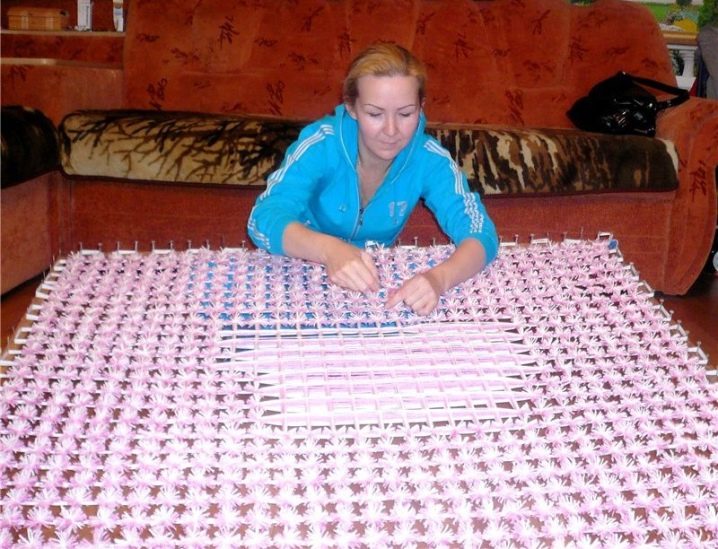
In addition, manual labor is expensive. It is calculated at the rate per 1 meter of raw materials used for the total amount or on the basis of the time spent at the rate per hour. It will not be possible to save money: both methods are quite costly.
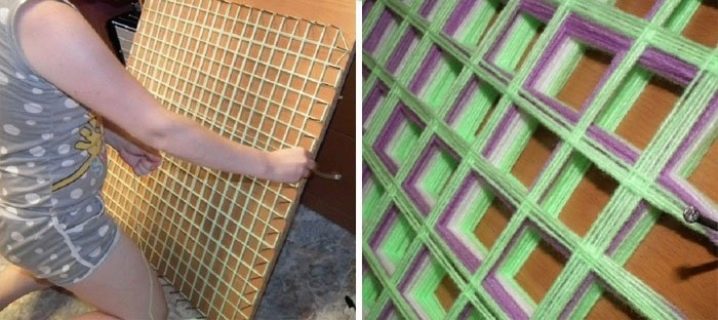
If you want to buy a finished product with a tempting price online, you should think about it: quality raw materials and labor are not cheap.
Manufacturing techniques: which is better?
Such products are made exclusively at home using one of the following techniques:
- classic knitted method from special pompom yarn according to the principle of order knitting;
- fragmentary method with the use of additional devices and preliminary assembly of balls-pom-poms;
- one-piece fabric on a sewing machine, in which the blanket is created from a special yarn-braid with often located pom-poms at the edges;
- unconventional, in which the main tool is a wooden frame.
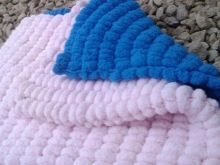
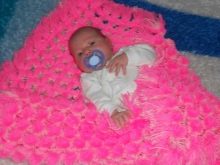
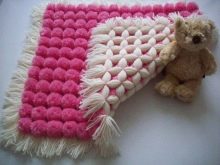
From pompom yarn
This method is knitting a yarn fabric with thickenings that give the product texture. Such a blanket is very soft, double-sided, knits like a scarf and does not need additional decor that simplifies texture. The work uses one thread, the pom-poms of which can be of one or several shades, which determines the color of the product.
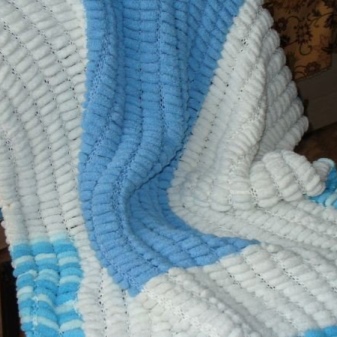
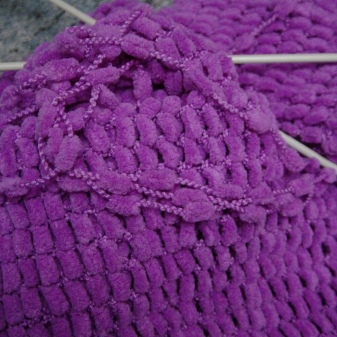
From individual balls
The fragmentary method is quite laborious: it begins with the execution of many separate pom-pom blanks. To do this, they are performed in the old fashioned way, using double cardboard blanks with a hole in the center for winding yarn. Having wound the required number of threads, they are connected with a strong knot, then cut along a larger diameter between two cardboard rings. The assembly is done by manually linking the fragments.
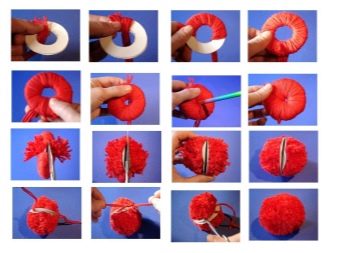
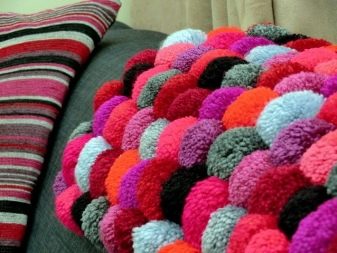
From pompom braid
The easiest, but not the cheapest, method of making is to use a special yarn-braid with multi-colored pom-poms on transverse threads. It will take a minimum of time to create, and the model will turn out to be not only special, but also durable.The braid is sewn one on top of the other, cutting it into strips of identical length or not cutting it, in a circle, not forgetting to add an allowance in the corners for each subsequent row.
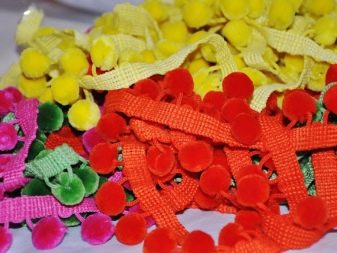
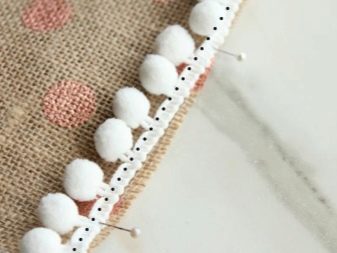
On a frame or plywood sheet
This method is the most creative and allows you to create a whole canvas without compromising the quality and appearance of the pom-poms. The whole difficulty of creating a blanket lies in the preparation of a special device, which can be a wooden frame or a sheet of plywood with nails nailed along the perimeter at the same distance.
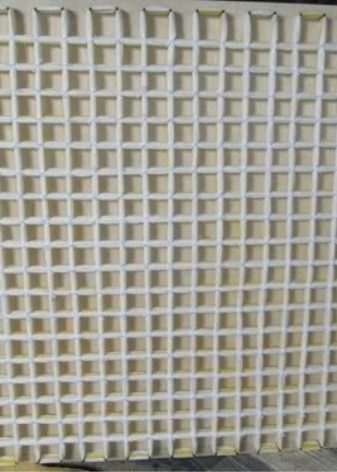
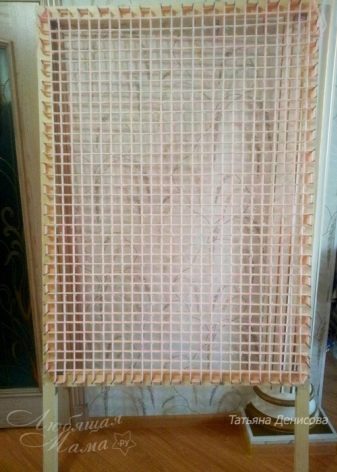
No knitting: a pom-pom blanket is created by winding threads in a specific sequence until the required number of layers is reached (30 or more). The wrapped yarn device resembles a plain weave. After winding, each cross is fixed with tight knots of double warp threads, after which the required number of layers is counted and the threads are cut. It turns out a plaid on a powerful and solid basis.
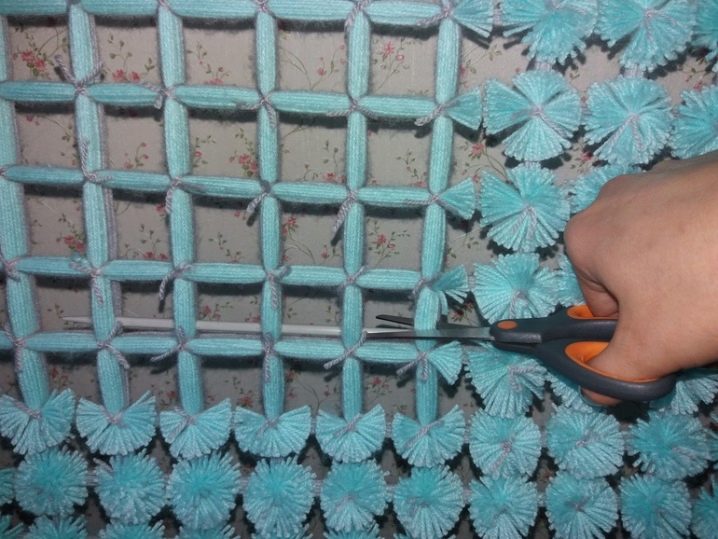
How to choose?
Despite the external beauty, there are differences in pom-pom blankets. If you want to buy or order such an accessory for yourself or your loved ones, you should choose products with a high-quality base. The durability of the product and its appearance after washing depend on it. In this regard, the best models will be options from pom-pom yarns and models created from braid with pom-poms.
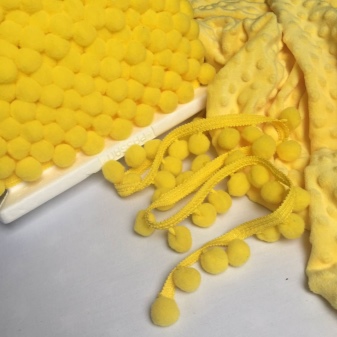
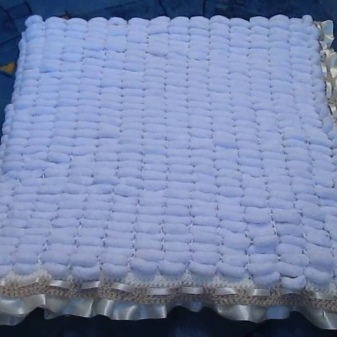
When choosing models with balls made on your own at home, you should give preference to a product made on a frame. Its basis is more practical. In addition to the base, it is worth considering the number of sides: models with pompoms in the form of balls have one textured side and the other smooth side.
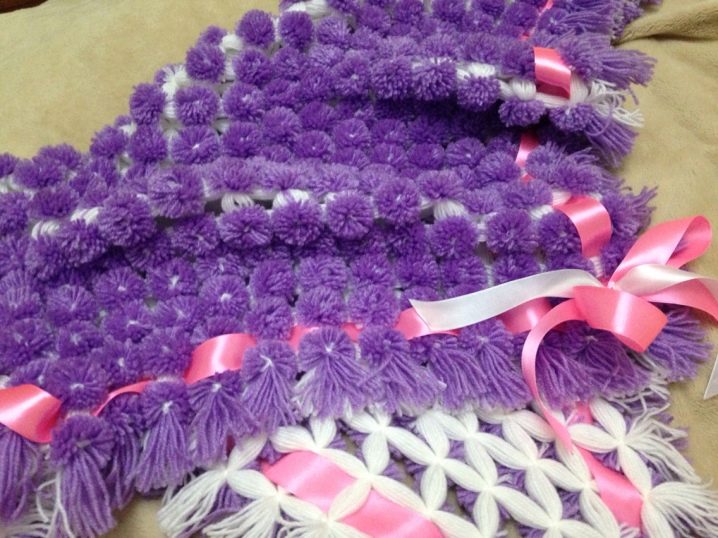
If you want to buy a universal version of the "plaid-bedspread-blanket", you should pay attention to the models made of pompom yarn: they can be used by either side.
When choosing a product made of pom-pom balls, it is worth taking a closer look at their volume and the number of threads: empty pom-poms look poor, as if they did not have enough material for them. In addition to the orphan look, such a blanket has large voids between the fragments. However, excessive volume is also undesirable: the thread connecting the elements may break, which will lead to the pompom crumbling.
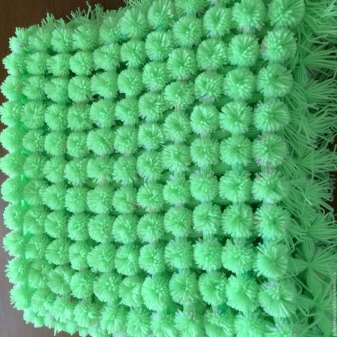
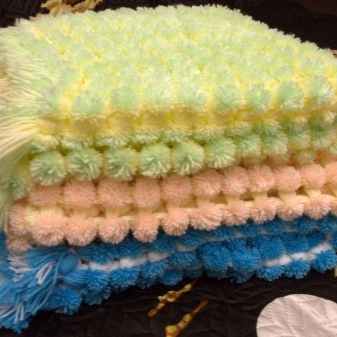
Another factor of choice is the age of the user: the ideal choice for models for babies is knitted models made of pompom yarns. In addition to a bedspread, blanket or blanket, they can be an alternative to a stroller mattress, without harming the baby's health and without disrupting the correct formation of the curves of the spine. Styles with full-fledged balls are beautiful, unique, but they are not suitable as an envelope or a swaddling blanket for a newborn: the texture relief will cause discomfort to the baby from the back.
These blankets are good as bedspreads, blankets or rugs. They are not suitable for a baby who is just turning over and trying to crawl (they will create resistance, interfere with attempts to move, individual fibers can get into the mouth).
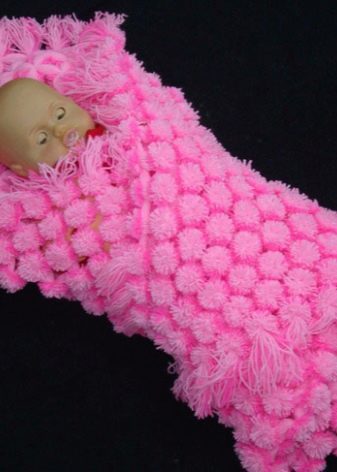
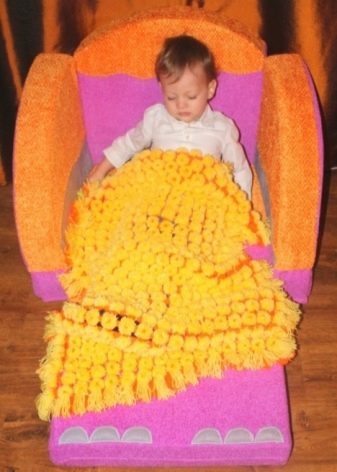
For children of preschool, school age and adults, all models are relevant, without exception. However, if you want to choose a practical thing, you should exclude the blanket from the fragments from the list. In addition, the option from the remains of yarn is also undesirable, because such a product is of different textures, which affects the general appearance.
For information on how you can make a blanket from pompons, see the next video.













The comment was sent successfully.